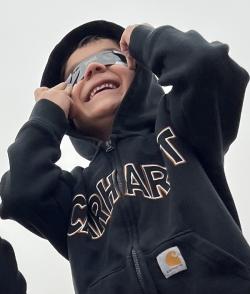
On Monday, April 8, 2024, people all across the nation celebrated the 2024 Total Solar Eclipse. NISE Network partner organizations came together in big, big ways, collaborating with a wide variety of institutions in their communities to engage learners of all ages and backgrounds in the science of solar eclipse. Whether or not these events were on the path of totality, and whether or not the weather cooperated, partners delivered some of the most astounding programming we've ever seen!
Here is a very small sample of the types of events hosted by partners, with links to more info, images and videos that capture the excitement generated by these extraordinary outreach efforts.
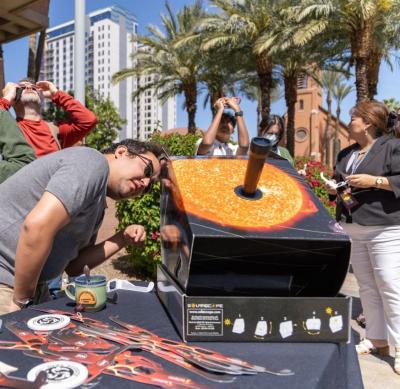
Arizona State University in Tempe, AZ - 64%
Safe viewing and eclipse activities at Arizona State University (ASU) were led by staff from ASU’s Center for Innovation in Informal STEM Learning, School for the Future of Innovation in Society. ASU’s School of Earth and Space Exploration and NASA’s Lunar Reconnaissance Orbiter Camera (LROC) also provided audiences with insights into lunar science and the significance of solar eclipses, focusing on the partial eclipse visible from Arizona. Professor of Advanced Technology Transitions, Andrew Maynard, put together a short video capturing the excitement of the event: https://youtu.be/Nwbjka9ZQzs
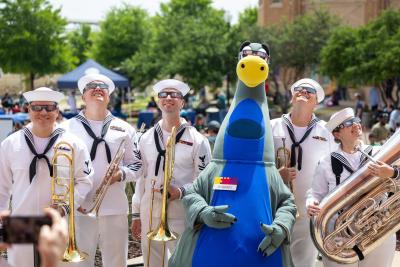
Fort Worth Museum of Science and History in Fort Worth, TX - 100%
The Fort Worth Museum of Science and History in Fort Worth, Texas, partnered with the Fort Worth Botanic Garden to become official National Science Teaching Association (NSTA)/Space Science Institute (SSI_ Solar Eclipse Partners. Both institutions offered reciprocal admission to programming in their indoor spaces, free educational activities outdoors, and free solar eclipse glasses for viewing at both locations. The Botanical Research Institute of Texas (BRIT) was on site doing research on how plants and wildlife were affected during the solar eclipse, and the Lighthouse for the Blind of Fort Worth also attended to provide special activities at the garden for visually impaired participants. The Museum’s work was supported by the Simons Foundation and is part of its ‘In the Path of Totality’ initiative.
If you would like to learn more about this work, check out the recording of our January 2024 NISE Network Online Workshop: Totality or Bust! Partners Talk Planning for the 2024 Total Solar Eclipse. During this presentation, Amber Shive, Vice President of Education at Fort Worth Museum of Science and History, joined us to discuss planning for this exciting event.
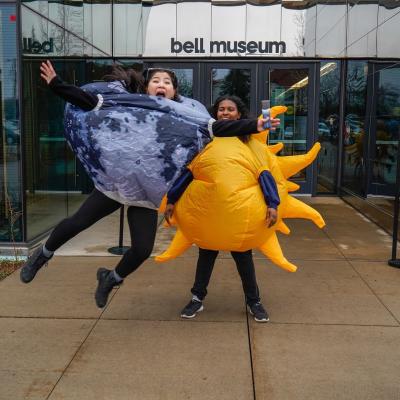
Bell Museum in Saint Paul, MN - 75%
The April 8th Solar Eclipse wrapped up The Bell Museum's Solar Big Year, which also included events held on October 14, 2023 for the Annular Eclipse as well as the museum's sixth annual Space Fest in February 2024. Sadly, on April 8th, heavy cloud cover and stormy skies didn’t allow the Sun to peak out until long after peak partial eclipse viewing. Nonetheless, museum visitors enjoyed a plethora of solar focused activities inside and outside, including activities like Big Sun, Small Moon and Sun Safety - Make a UV Detector, (similar to Exploring Properties: UV Beads). The museum provided eclipse focused content in the planetarium and also had multiple indoor locations where guests could view a live stream of the eclipse from the path of totality. In one viewing space, audiences of all ages were invited to make their own eclipse flip book while watching the livestream. Finally, the museum also had an online compilation of Solar Eclipse Educator Resources for teachers to engage students in the excitement of the solar eclipse.
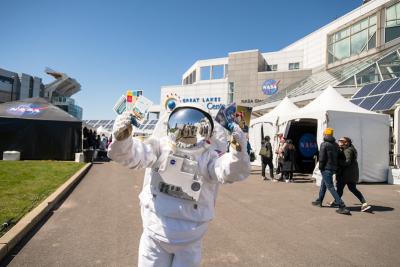
Great Lakes Science Center in Cleveland, OH - 100%
Great Lakes Science Center and NASA’s Glenn Research Center held a huge three-day festival that included performances by The Cleveland Orchestra, presentations like The City Club of Cleveland's coffee table talk with Star Trek Science Advisor, Dr. Erin Macdonald, numerous immersive experiences in NASA Village that featured NASA’s major missions and cutting-edge projects that will advance space exploration and revolutionize air travel, and so much more! In the end, the final attendance count for Total Eclipse Fest 2024 was 36,789 people!! These photos from this spectacular three-day event do a great job capturing the success and incredible substance of festivities: https://flickr.com/photos/nasaglenn/albums/72177720316031575/
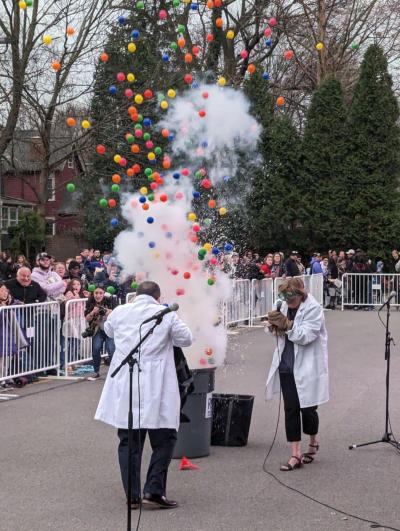
Rochester Museum & Science Center in Rochester, NY - 100%
Rochester Museum & Science Center, Visit Rochester, and countless others in the city of Rochester, New York were involved in a collaborative effort of mass proportions. Roc the Eclipse 2024 was a three-day event that truly brought together the entire community and featured everything “under the Sun." From robotics demonstrations and hands-on activities, to concerts and planetarium shows, to safe solar viewing and so much more! Even with cloudy skies on the big day, audiences experienced the eclipse in a big way! Check out this 23 second time-lapse video to see just how dark totality was in Rochester, NY: https://fb.watch/ryCCFEl3qy/
After the eclipse, this event’s great success was acknowledged by the city's mayor, who honored the core team members behind these incredible efforts, including long-time NISE Network partner Daniel Schneiderman. A big congrats to Daniel and his amazing team and collaborators for the incredible work they put into what was literally an event years in the making! If you would like to hear more from Daniel about this work, check out the recording of our January 2024 NISE Network Online Workshop: Totality or Bust! Partners Talk Planning for the 2024 Total Solar Eclipse where he discusses planning for this amazing endeavor.
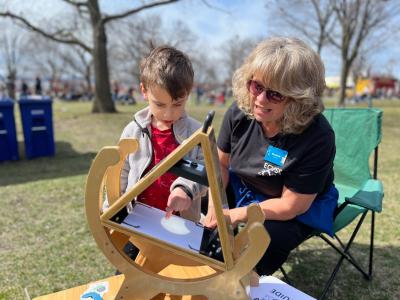
ECHO, Leahy Center for Lake Champlain in Burlington, VT - 100%
ECHO, Leahy Center for Lake Champlain in Burlington, Vermont had a Solar Eclipse Festival with events on site as well as educational tents hosted at two City of Burlington viewing sites where staff, educators, and volunteers interacted with community members. This was not the only way ECHO brought the eclipse to the community outside of their space. To spark the joy of scientific discovery and promote safe viewing practices in communities across Vermont, ECHO partnered with local organizations, schools, and libraries and produced 52 custom Eclipse Outreach Kits with educational resources and activities. These kits were distributed to libraries, schools, and community service organizations across Vermont to help facilitate eclipse education, catalyze community viewing events, and promote safe observation practices. In addition, ECHO created digital resources for a Total Solar Eclipse Pop-Up Exhibit that are available for free download and use in educational settings. This work is supported by the Simons Foundation and is part of its ‘In the Path of Totality’ initiative.
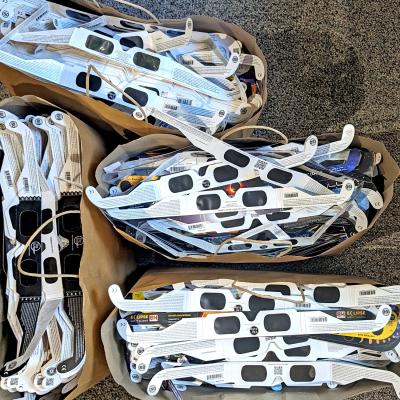
Montshire Museum of Science in Norwich, VT - 99%
Montshire Museum of Science couldn’t have asked for a more perfect day on April 8th for safe solar eclipse viewing. Their events started the day before with hands-on eclipse activities, StarLab planetarium shows and presentations from two Dartmouth researchers. With perfect weather during the main event, participants enjoyed a fantastic view and special activities that explored phenomena around eclipses. Post event, the museum led a collection of used solar eclipse glasses that ended on April 22nd, which is a great nod to Earth Day as well! By partnering with Astronomers Without Borders, the museum served as an official collection site for gently used eclipse glasses. The collection far exceeded their expectations, as glasses came in from all over the country, some even including nice handwritten notes of appreciation.
For anyone who would still like to recycle their eclipses glasses, check out Astronomers Without Borders Solar Glasses Recycling And Distribution. Here you will find info about how glasses are vetted for safety and redistributed, where you can find a collection site near you, and how your institution can become a collection site.
For more info about reusing safe solar viewers, check out our blog post: "What should I do with my used solar eclipse safety viewing glasses?"
Thank you to all of our partners for your remarkable efforts that united communities, educated masses, and excited us all for humankind's next giant leap in space exploration.
Cheers and see you in 2045!
